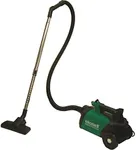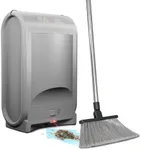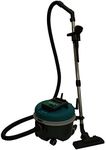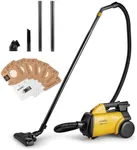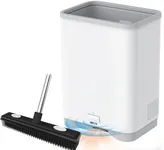Buying Guide for the Best Bissell Canister Vacuums
Choosing a canister vacuum, like those from Bissell, is about matching your cleaning needs with the vacuum's abilities. Canister vacuums are known for being versatile and easier to maneuver around furniture and onto different surfaces compared to upright vacuums. To make the smartest choice, think about the areas you’ll clean most often, any special features you might need, and your comfort when handling or storing the vacuum.Suction PowerSuction power refers to how effectively a vacuum pulls dirt and debris from surfaces. Strong suction matters for deep-cleaning carpets and tackling stubborn messes, while medium suction might be plenty for hardwood floors or tiles. If you primarily have carpeted rooms or pets that shed a lot, look for higher suction; for mostly bare floors, moderate levels will do the job nicely.
Filtration SystemThe filtration system traps dust, allergens, and tiny particles so they don’t escape back into the air. For homes with allergy sufferers or pets, a vacuum with HEPA filtration is recommended as it catches very fine particles. If allergies aren’t a big concern, standard filters are usually sufficient, but always check how easy it is to clean or replace the filter for regular maintenance.
Cord Length and Hose ReachCord length and hose reach determine how far you can clean without changing power outlets or moving the whole unit. Longer cords and hoses are best for larger spaces or if you want to clean stairs, curtains, or car interiors easily. For smaller apartments or focused cleaning zones, shorter cords and hoses are less of a hassle and easier to store.
Capacity (Dust Bin/Bag Size)The capacity is about how much dirt the vacuum can hold before you need to empty it or change the bag. Larger capacities mean you clean bigger areas with fewer interruptions, while smaller ones keep the vacuum lighter and more compact. If your cleaning sessions are quick or your space is small, a smaller bin or bag is fine; for frequent, whole-house cleaning, a larger capacity saves time.
Weight and ManeuverabilityWeight and how easily you can move the vacuum affect your cleaning comfort, especially if you carry it up stairs or weave among furniture. Lighter models are best if you clean multiple floors or have limited strength, while heavier models may feel sturdier and sometimes offer stronger suction. Think about your typical cleaning routine—do you move around a lot or mostly stick to one spot—to guide your choice.
Attachments and ToolsAttachments like brushes, crevice tools, or pet hair tools add versatility to your vacuum. If you have diverse surfaces, pets, or want to clean upholstery and tight spots, more specialized tools can make the job easier. If your needs are basic, fewer attachments keep things simple. Consider what you’ll clean most—pet beds, car seats, stairs—to decide which extras might matter.
Noise LevelNoise level affects your comfort, especially in apartments or households with young children or pets. Quieter vacuums make long cleaning sessions more pleasant and less disruptive. If this is important for you, check for models that mention low decibel ratings or sound-dampening features; if you don't mind some noise, just focus on the key cleaning features.



